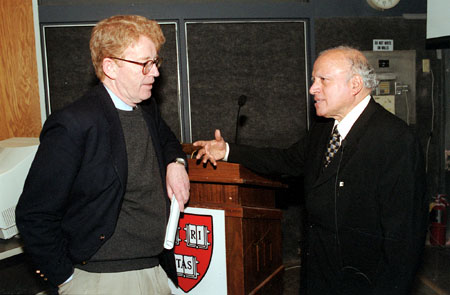‘Evergreen Revolution’ called for

An Indian agricultural expert has called for an “Evergreen Revolution” in growing food crops that would combine science, economics, and sociology to boost production in a way that can be maintained for decades to come.
M.S. Swaminathan, a world-renowned agricultural scientist, outlined a plan that focuses on educating women in developing countries, getting new technology out to rural areas, and incorporating into farming practices scientific advances such as genetically engineered crops and new techniques to conserve water.
“If the future is to be truly sustainable, it must have all these factors: economics, equity, and employment,” said Swaminathan, who addressed about 100 who gathered March 9 in the Science Center.
Swaminathan’s lecture was sponsored by the University Committee on the Environment, the School of Public Health’s Program on Water and Health, the Working Group on Environmental Justice and the Education Development Center Inc.
“It’s clear that a focus on major developing economies such as India are a major focus of a university such as Harvard,” said Michael McElroy, Butler Professor of Environmental Studies and chair of the University Committee on the Environment. “This is our effort to self-educate.”
Driving Swaminathan’s call for a new revolution in agriculture is the fact that the world’s population is still expanding while much of the world’s usable land is already growing crops and many groundwater supplies are being used faster than they’re being replenished.
“Progress today should not be at the expense of progress tomorrow,” Swaminathan said.
Swaminathan served as India’s secretary of the Ministry of Agriculture and Co-operation and has headed several research and conservation organizations. He has been credited as the architect of India’s “Green Revolution” during which farm production increased dramatically.
Swaminathan drew his lessons from India, which he called “a great laboratory of learning” and home to one-sixth of the world’s population.
One major challenge, he said, is addressing the “gender divide.” Both poverty and farming are increasingly dominated by women in India, so programs have to be devised that target them.
Another challenge is how to get new advances in biotechnology into the field. In India, several different avenues are being pursued, from a “biovillage” built around a resource center where local people can learn about new advances, to whole “biovalleys” where production is centered on certain crops, such as medicinal plants and herbs.
Technology is often seen as creating a “digital divide” between the technological haves and have-nots, but technology has the power to be an equalizing influence between the rich and poor in the world, Swaminathan said. In order to make a difference, relevant technology has to be distributed to those who can use it.
“We have to research delivery systems, because without them only the haves will have it [technology] and the have-nots won’t,” Swaminathan said.
One example of appropriate use of technology occurred in a fishing village where the men still fish from old-style catamarans. The catamarans are vulnerable during storms and high seas. By installing a few computers with Internet hookups, women in the village are able to check sea conditions and broadcast them to the whole village from a loudspeaker at the top of a building.
That village’s example illustrates that when new technology is relevant and useful, even poor, semiliterate people will readily adopt it.
“When information becomes need-based and demand-driven, then it makes a difference,” Swaminathan said. “To bridge the digital divide, start with the poorest person. If you attend to the poorest person, everyone will benefit.”
With progress in biotechnology has come an increasing emphasis on profits and a trend to patent every advance. Swaminathan urged private companies and researchers to keep in mind the public good in deciding how to use their discoveries.
“Where there is enormous power there is also enormous responsibility,” Swaminathan said. “The ultimate aim is sustainable human happiness.”




